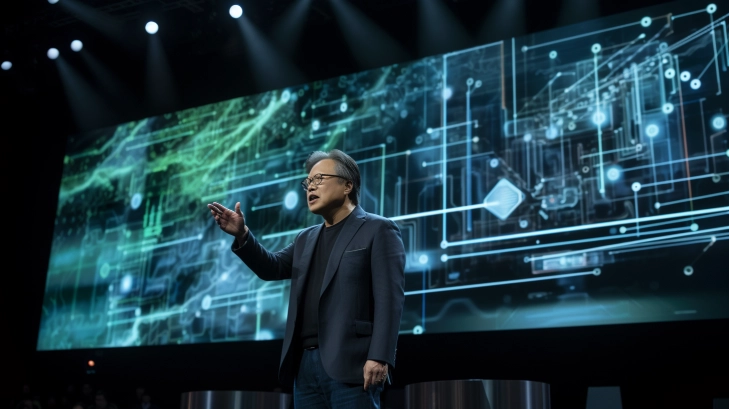Table of Contents
During the New York Times’ annual DealBook summit, Nvidia’s CEO, Jensen Huang, expressed his belief that AI’s journey is rapidly catching up to human capabilities.
At the 2023 New York Times DealBook Summit, Andrew Ross Sorkin from the publication inquired of Huang whether he anticipated the emergence of AGI within the next decade.
AI’s Human-Like Leap: Nvidia CEO’s Prediction

Huang stated that if we define artificial general intelligence (AGI) as a computer that can perform tests in a manner comparable to human intelligence, then we can expect to witness AI’s journey for capable of achieving such feats within the next five years.
Nvidia is experiencing significant growth in its business due to the increasing need for powerful graphics processing units (GPUs) in various industries such as automotive, architecture, electronics, engineering, scientific research, and even for OpenAI’s ChatGPT. This surge in demand is primarily driven by the requirement to train models of AI’s journeys and handle resource-intensive tasks efficiently.
During Nvidia’s third fiscal quarter, the company’s revenue increased threefold, and its net income rose to $9.24 billion from $680 million in the previous year.
AI’s Journey: Nvidia CEO on AGI and Collaborative Chip Design
Although the CEO did not provide a specific description of his perception of AGI, Ross Sorkin inquired whether AGI would encompass AI’s journey capable of designing the chips currently manufactured by Nvidia, a question to which Huang concurred.
During the interview on Wednesday, Huang reminisced about delivering the first-ever AI supercomputer to OpenAI. This was after Elon Musk, who was a co-founder of the AI project before leaving in 2018, heard Huang speak about the device at a conference. Huang mentioned that Musk was impressed with the supercomputer and requested one for OpenAI. Huang then delivered the AI’s journey world’s first supercomputer to OpenAI on that very day.
According to him, Nvidia is shipping H-100 chips today which were designed with the assistance of several AI’s journey. He emphasized the importance of AI’s journey in software development and chip designing, stating that nothing can be achieved without it.
Corporate Governance and AI’s Limitations: Insights from Huang
Huang expressed his contentment with the resolution of the turmoil that surrounded OpenAI, including the changes in its board structure and the removal and reinstatement of CEO Sam Altman. He also emphasized the significance of corporate governance, citing Nvidia’s successful 30-year history and the importance of proper company setup in overcoming adversity.
Onstage, Huang was requested to assess the achievements of different companies in the AI industry.
Huang stated that he had no intention of ranking his friends. He confessed that he has the desire to do so, but he will refrain from actually doing it.
He stated that the pace of advancement is undoubtedly remarkable. However, there exists a multitude of tasks that are still beyond our capabilities.
According to him, AI is incapable of performing the complex reasoning that humans excel at. The CEO’s perspective on AGI arises amidst concerns expressed by certain business leaders regarding their own perception of AGI.
AI’s Unchecked Evolution: Concerns and Acknowledgments
Ilya Sutskever, one of the co-founders of OpenAI, the organization responsible for ChatGPT, stated that highly advanced AI could give rise to various challenges, including an increase in fake news and cyberattacks, the development of automated AI weapons, and the potential establishment of “infinitely stable dictatorships.”
Ian Hogarth, an investor in over 50 AI companies, has warned that the unregulated advancement of technology could result in a “God-like AI” that could render humans obsolete or even lead to their destruction.
Huang stated that everyone is actively engaged in the task while emphasizing the rapid advancement of technology. Huang further acknowledged the undeniable fact that the pace of progress is indeed remarkable.
Additionally, Huang highlighted the distinction between the current capabilities of models and intelligence, emphasizing their interconnectedness yet acknowledging their dissimilarities.





